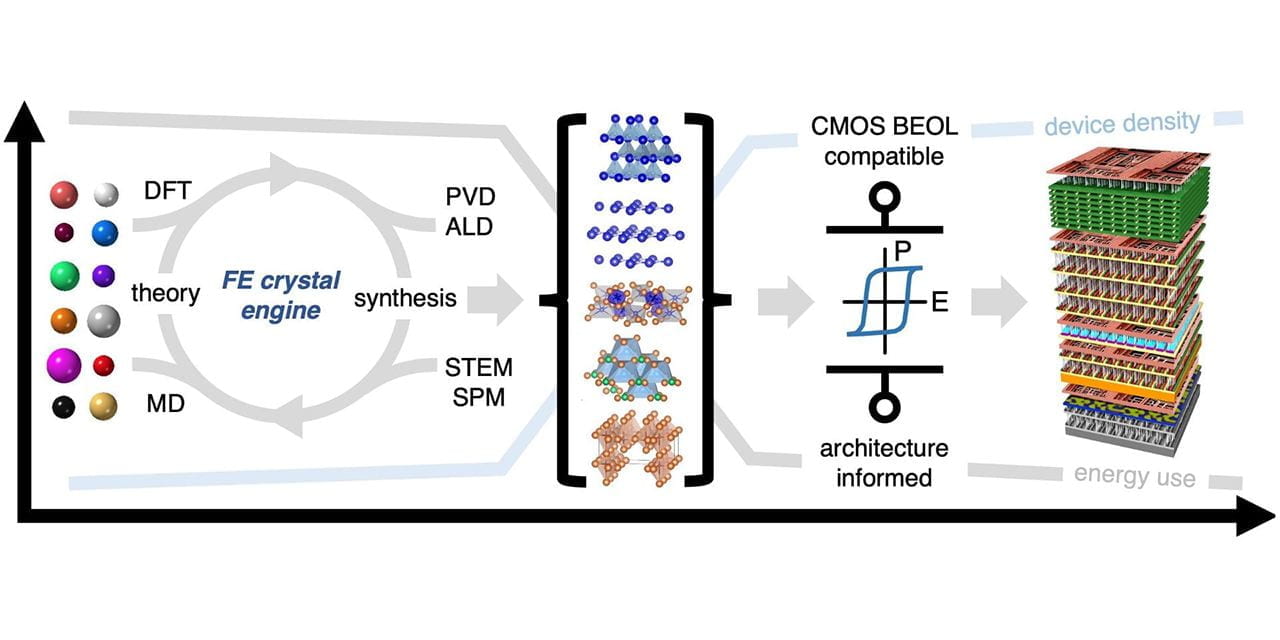Overview:
The ASCENT project aims to revolutionize computing efficiency by developing a novel hardware platform called the Ferroelectric-based Compute-in-Memory Dynamical Engine (FerroCoDE). This groundbreaking platform harnesses the inherent efficiency of physical phenomena in nature, specifically entropy maximization, to create unique synergies between physics and computation. The FerroCoDE platform will enable orders-of-magnitude improvements in computational efficiency, unlocking the potential for deploying relevant applications at a scale and in energy-constrained environments that are currently beyond the reach of present-day computers.
The ASCENT project addresses a critical systems challenge by designing, fabricating, and demonstrating a Ferroelectric Hafnium Oxide (HfO2) based Compute-in-Memory (CiM) Dynamical Engine (FerroCoDE). This innovative solution leverages the rich non-linear analog dynamics of oscillators in conjunction with the area and energy efficiency of ferroelectric CiM architecture to accelerate the computationally challenging maximum satisfiability problem. The FerroCoDE employs a novel formulation of the satisfiability problem as the direct maximization of entropy in the compute engine. This formulation is being developed through a vertically integrated materials-to-systems effort that focuses on:
- Development of phase- and crystallographic-texture-engineered HfO2-based ultra-thin ferroelectric and antiferroelectric films with tunable properties
- Design and fabrication of a novel non-volatile 1FeFET-1FTJ memory cell and array to enable in-memory programming and evaluation of the satisfiability clauses
- Energy-efficient AFE oscillator arrays
- Synergistic convergence between the hardware and algorithm
- System engineering, with emphasis on developing learning algorithms to optimize dynamical system initialization, development of annealing schedules, and hardware scalability
- Development and demonstration of a FerroCoDE prototype on PCB
Research outcomes:
1. Mallick, Antik and Zhao, Zijian and Bashar, Mohammad Khairul and Alam, Shamiul and Islam, Md Mazharul and Xiao, Yi and Xu, Yixin and Aziz, Ahmedullah and Narayanan, Vijaykrishnan and Ni, Kai and Shukla, Nikhil “CMOS-compatible ising machines built using bistable latches coupled through ferroelectric transistor arrays” Scientific Reports , v.13 , 2023 https://doi.org/10.1038/s41598-023-28217-8
2. Deng, Shan and Benkhelifa, Mahdi and Thomann, Simon and Faris, Zubair and Zhao, Zijian and Huang, Tzu-Jung and Xu, Yixin and Narayanan, Vijaykrishnan and Ni, Kai and Amrouch, Hussam “Compact Ferroelectric Programmable Majority Gate for Compute-in-Memory Applications” 2022 International Electron Devices Meeting (IEDM) , 2022 https://doi.org/10.1109/IEDM45625.2022.10019400
3. Xiao, Yi and Xu, Yixin and Jiang, Zhouhang and Deng, Shan and Zhao, Zijian and Mallick, Antik and Sun, Limeng and Joshi, Rajiv and Li, Xueqing and Shukla, Nikhil and Narayanan, Vijaykrishnan and Ni, Kai “On the Write Schemes and Efficiency of FeFET 1T NOR Array for Embedded Nonvolatile Memory and Beyond” IEDM , 2022 https://doi.org/10.1109/IEDM45625.2022.10019542
4. Tang, Wenjun and Lee, Mingyen and Wu, Juejian and Xu, Yixin and Yu, Yao and Liu, Yongpan and Ni, Kai and Wang, Yu and Yang, Huazhong and Narayanan, Vijaykrishnan and Li, Xueqing “FeFET-Based Logic-in-Memory Supporting SA-Free Write-Back and Fully Dynamic Access With Reduced Bitline Charging Activity and Recycled Bitline Charge” IEEE Transactions on Circuits and Systems I: Regular Papers , v.70 , 2023 https://doi.org/10.1109/TCSI.2023.3251961
5. Ma, Xiaoyang and Deng, Shan and Wu, Juejian and Zhao, Zijian and Lehninger, David and Ali, Tarek and Seidel, Konrad and De, Sourav and He, Xiyu and Chen, Yiming and Yang, Huazhong and Narayanan, Vijaykrishnan and Datta, Suman and Kämpfe, Thomas and Luo, Q “A 2-Transistor-2-Capacitor Ferroelectric Edge Compute-in-Memory Scheme with Disturb-Free Inference and High Endurance” IEEE Electron Device Letters , 2023 https://doi.org/10.1109/LED.2023.3274362
Funding Source:
National Science Foundation (October 2021 – September 2025)
Funding Collaborators:
- Nikhil Shukla – University of Virginia
- Mircea Stan – University of Virginia
- Jon Ihlefeld – University of Virginia

